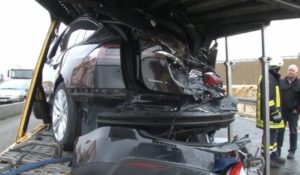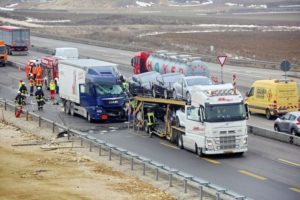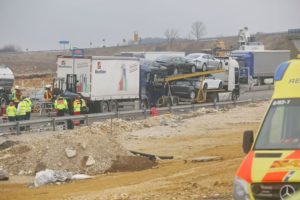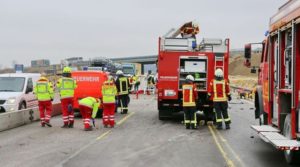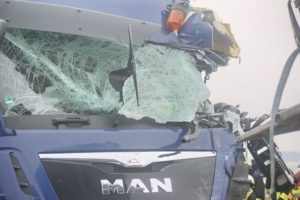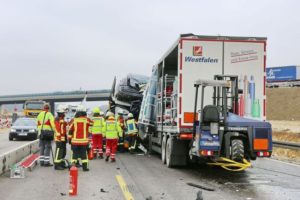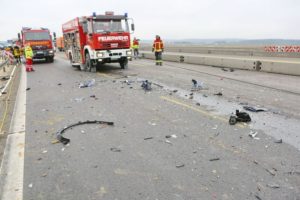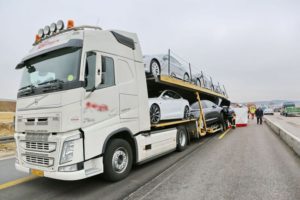News
Serious Tesla transporter accident on German Autobahn leaves one dead
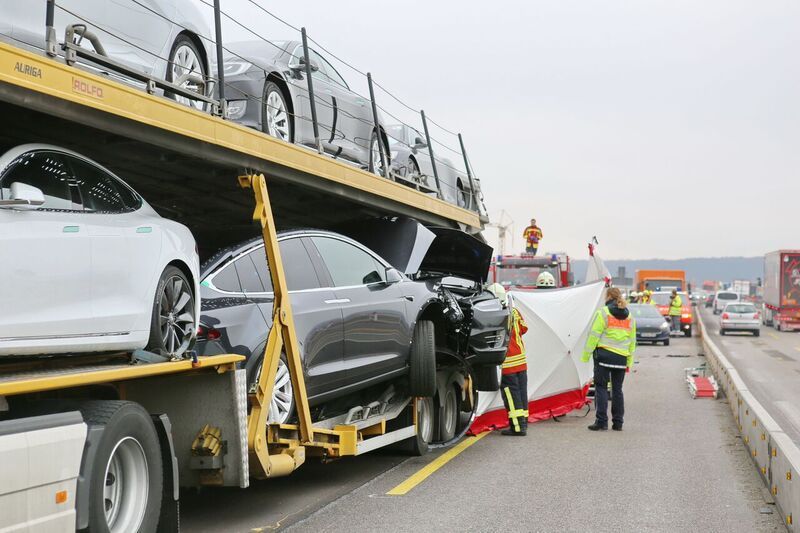
A 48-year old driver behind a semi-truck died Monday on the German Autobahn after colliding with a Tesla transporter full of Model S and Model X vehicles.
The tragic accident, which was reported by Sudwest Presse, took place shortly before noon local time. Two trucks drove in the same direction in the right lane of the A8 toward Munich. At the Merklingen junction, all traffic stopped, but a delivery truck in the traffic queue was not able to brake in time, sending the cabin of his truck directly into the rear of the Tesla transporter.
As a result, the delivery truck crashed into the Tesla transporter. The violent impact resulted in injuries so severe that the transporter driver, who was pinned inside the cab, died on the scene. The driver of the Tesla transporter survived and was uninjured, according to Sudwest Press.
The shipment of Model S and Model X vehicles blocked the roadway for hours, with congestion reaching more than ten kilometers, or just over six miles. Several Tesla vehicles were destroyed, according to reports. Local police directed efforts to remove the Tesla fleet as it spread across the Autobahn roadway in order to provide vehicular access to the site. As the debris field was cleared, the Teslas were situated at the edge of the highway, away from emergency vehicles and personnel. The process to clear the roadway took until around 3.30 p.m., or several hours after the crash.
Property damage reports for the accident are about 720,000 euros, or roughly $775,000 U.S., which include the transporter and trailer in addition to the loss in Tesla vehicles. The closest Tesla facility is a Munich Tesla service center located at München-Feldkirchen, Hohenlindner Straße 48a.
The destroyed Teslas can be seen from images available through the German press. A Model S and a Model X are pictured at the end of the trailer.
All photos courtesy of Sudwest Presse.

News
Tesla lands massive deal to expand charging for heavy-duty electric trucks
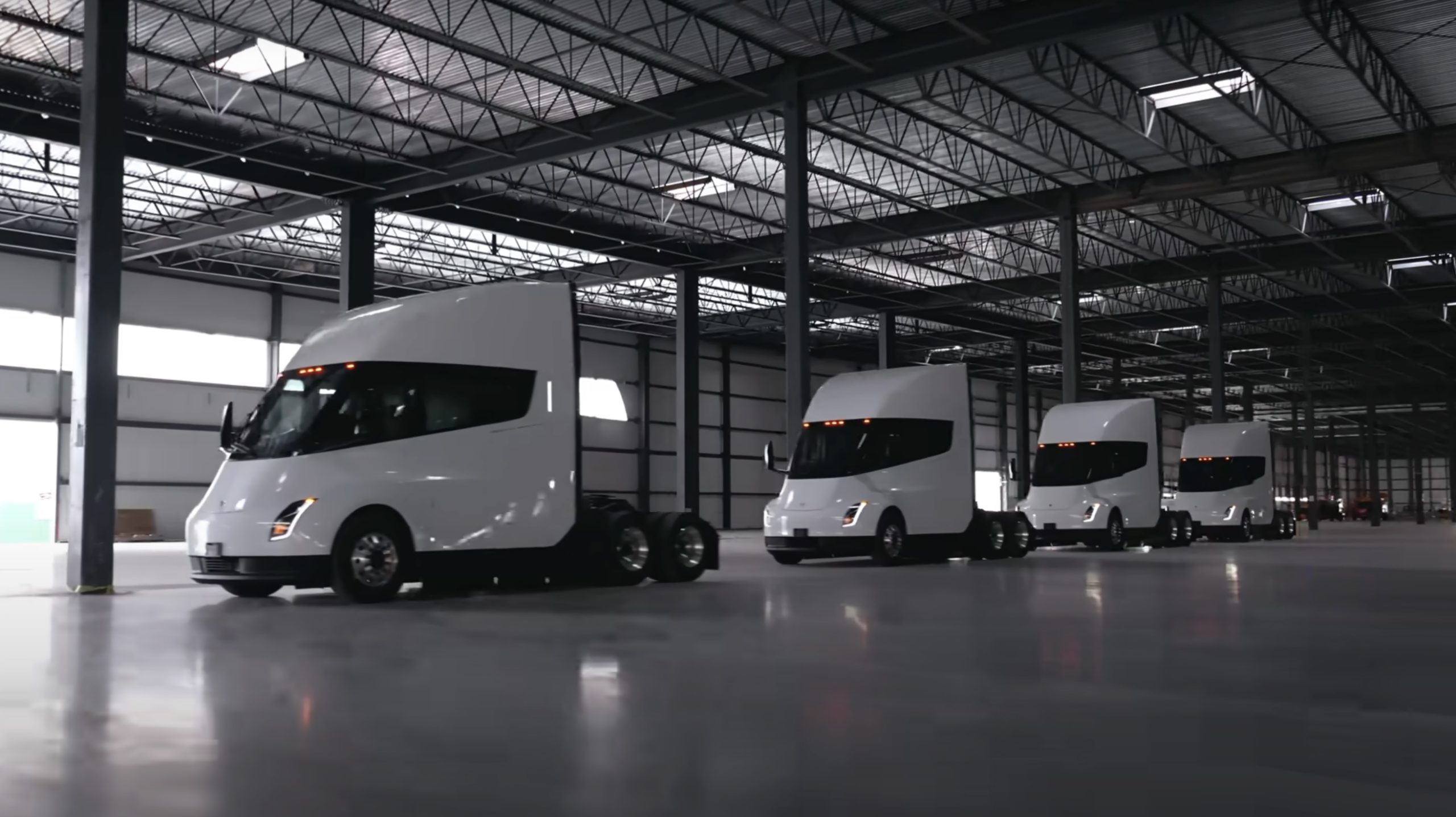
Tesla has landed a massive deal to expand its charging infrastructure for heavy-duty electric trucks — and not just theirs, but all manufacturers.
Tesla entered an agreement with Pilot Travel Centers, the largest operator of travel centers in the United States. Tesla’s Semi Chargers, which are used to charge Class 8 electric trucks, will be responsible for providing energy to various vehicles from a variety of manufacturers.
The first sites are expected to open later this Summer, and will be built at select locations along I-5 and I-10, major routes for commercial vehicles and significant logistics companies. The chargers will be available in California, Georgia, Nevada, New Mexico, and Texas.
Each station will have between four and eight chargers, delivering up to 1.2 megawatts of power at each stall.
The project is the latest in Tesla’s plans to expand Semi Charging availability. The effort is being put forth to create more opportunities for the development of sustainable logistics.
Senior Vice President of Alternative Fuels at Pilot, Shannon Sturgil, said:
“Helping to shape the future of energy is a strategic pillar in meeting the needs of our guests and the North American transportation industry. Heavy-duty charging is yet another extension of our exploration into alternative fuel offerings, and we’re happy to partner with a leader in the space that provides turnkey solutions and deploys them quickly.”
Tesla currently has 46 public Semi Charger sites in progress or planned across the United States, mostly positioned along major trucking routes and industrial areas. Perhaps the biggest bottleneck with owning an EV early on was charging availability, and that is no different with electric Class 8 trucks. They simply need an area to charge.
Tesla is spearheading the effort to expand Semicharging availability, and the latest partnership with Pilot shows the company has allies in the program.
The company plans to build 50,000 units of the Tesla Semi in the coming years, and with early adopters like PepsiCo, DHL, and others already contributing millions of miles of data, fleets are going to need reliable public charging.
🚨 Pilot working with Tesla to install and expand Semi Chargers is a perfect example of two industry leaders working together for the greater good.
As more commerce companies expand into EVs, Semi Charger will be more commonly available for electrified fleets, making efforts… pic.twitter.com/VPLIYyq15b
— TESLARATI (@Teslarati) January 27, 2026
Tesla is partnering with other companies for the development of the Semi program, most notably, a conglomeration with Uber was announced last year.
Tesla lands new partnership with Uber as Semi takes center stage
The ride-sharing platform plans to launch the Dedicated EV Fleet Accelerator Program, which it calls a “first-of-its-kind buyer’s program designed to make electric freight more affordable and accessible by addressing key adoption barriers.”
The Semi is one of several projects that will take Tesla into a completely different realm. Along with Optimus and its growing Energy division, the Semi will expand Tesla to new heights, and its prioritization of charging infrastructure.
Elon Musk
Elon Musk’s Boring Company opens Vegas Loop’s newest station
The Fontainebleau is the latest resort on the Las Vegas Strip to embrace the tunneling startup’s underground transportation system.
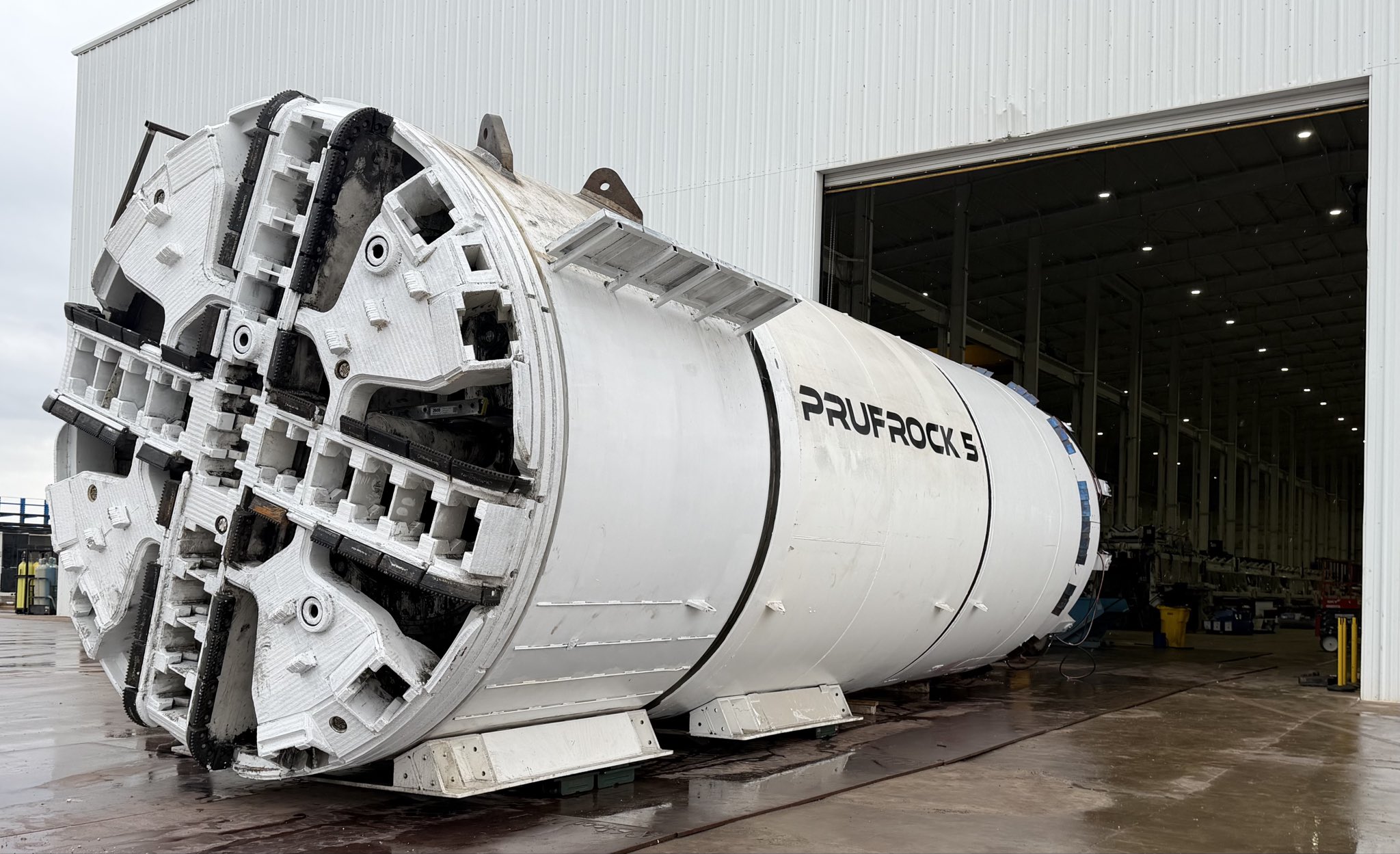
Elon Musk’s tunneling startup, The Boring Company, has welcomed its newest Vegas Loop station at the Fontainebleau Las Vegas.
The Fontainebleau is the latest resort on the Las Vegas Strip to embrace the tunneling startup’s underground transportation system.
Fontainebleau Loop station
The new Vegas Loop station is located on level V-1 of the Fontainebleau’s south valet area, as noted in a report from the Las Vegas Review-Journal. According to the resort, guests will be able to travel free of charge to the stations serving the Las Vegas Convention Center, as well as to Loop stations in Encore and Westgate.
The Fontainebleau station connects to the Riviera Station, which is located in the northwest parking lot of the convention center’s West Hall. From there, passengers will be able to access the greater Vegas Loop.
Vegas Loop expansion
In December, The Boring Company began offering Vegas Loop rides to and from Harry Reid International Airport. Those trips include a limited above-ground segment, following approval from the Nevada Transportation Authority to allow surface street travel tied to Loop operations.
Under the approval, airport rides are limited to no more than four miles of surface street travel, and each trip must include a tunnel segment. The Vegas Loop currently includes more than 10 miles of tunnels. From this number, about four miles of tunnels are operational.
The Boring Company President Steve Davis previously told the Review-Journal that the University Center Loop segment, which is currently under construction, is expected to open in the first quarter of 2026. That extension would allow Loop vehicles to travel beneath Paradise Road between the convention center and the airport, with a planned station located just north of Tropicana Avenue.
News
Tesla leases new 108k-sq ft R&D facility near Fremont Factory
The lease adds to Tesla’s presence near its primary California manufacturing hub as the company continues investing in autonomy and artificial intelligence.
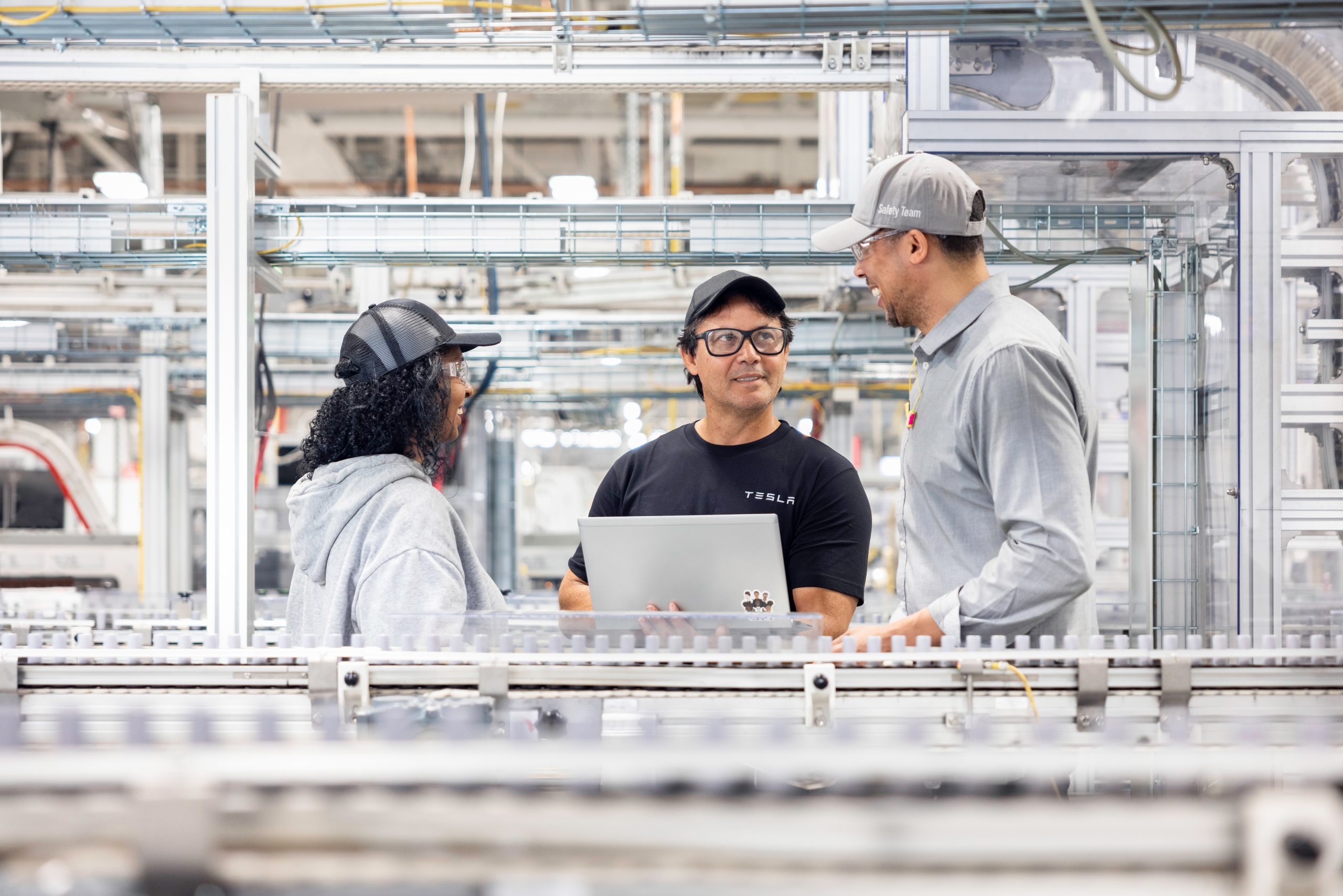
Tesla has expanded its footprint near its Fremont Factory by leasing a 108,000-square-foot R&D facility in the East Bay.
The lease adds to Tesla’s presence near its primary California manufacturing hub as the company continues investing in autonomy and artificial intelligence.
A new Fremont lease
Tesla will occupy the entire building at 45401 Research Ave. in Fremont, as per real estate services firm Colliers. The transaction stands as the second-largest R&D lease of the fourth quarter, trailing only a roughly 115,000-square-foot transaction by Figure AI in San Jose.
As noted in a Silicon Valley Business Journal report, Tesla’s new Fremont lease was completed with landlord Lincoln Property Co., which owns the facility. Colliers stated that Tesla’s Fremont expansion reflects continued demand from established technology companies that are seeking space for engineering, testing, and specialized manufacturing.
Tesla has not disclosed which of its business units will be occupying the building, though Colliers has described the property as suitable for office and R&D functions. Tesla has not issued a comment about its new Fremont lease as of writing.
AI investments
Silicon Valley remains a key region for automakers as vehicles increasingly rely on software, artificial intelligence, and advanced electronics. Erin Keating, senior director of economics and industry insights at Cox Automotive, has stated that Tesla is among the most aggressive auto companies when it comes to software-driven vehicle development.
Other automakers have also expanded their presence in the area. Rivian operates an autonomy and core technology hub in Palo Alto, while GM maintains an AI center of excellence in Mountain View. Toyota is also relocating its software and autonomy unit to a newly upgraded property in Santa Clara.
Despite these expansions, Colliers has noted that Silicon Valley posted nearly 444,000 square feet of net occupancy losses in Q4 2025, pushing overall vacancy to 11.2%.
